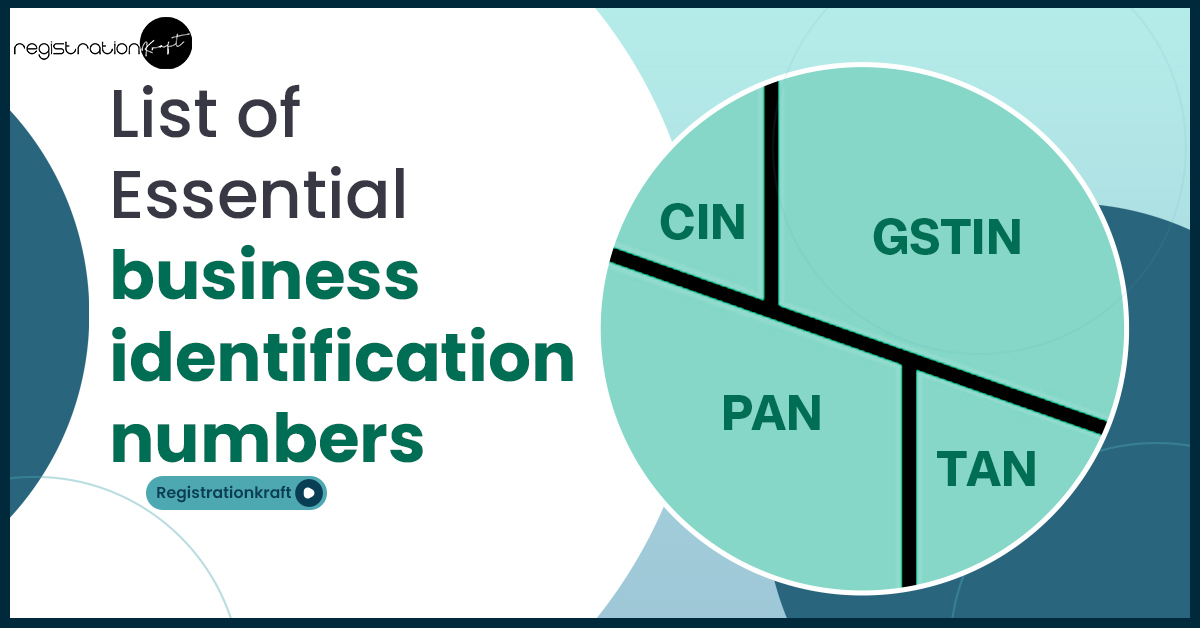Whether you are already running a business in India or looking to start, it is extremely necessary to taken into account all the legal compliances to give a safe and secure identification to your business identity. In addition, doing would help you avoid any underlying penalty due to non-compliance. A majority of business owners understand the importance of having a unique identity for their businesses to avoid counterfeiting or fraud done under a name that is intrinsically yours.
Essential Business ID’s
So, for your reference, we have highlighted some commonly used business identifiers that you should be aware of:
1. Corporate Identification Number (CIN)
It is a 21-digit unique alphanumeric code that is allotted to businesses operating in India from the Registrar of Companies (RoC). A CIN number is given to all types of companies in India such as One Person Company, Private Limited Company, Limited Company, Nidhi Company, Section 8 Company, and Producer Registered Company. One major purpose of this Corporate Identification Number (CIN) is to track all elements of an organization by the Registrar of Companies (RoC). This number must be quoted in all dealings being done with the RoC.
2. Goods and Services Tax Identification Number (GSTIN)
GSTIN stands Goods and Services Tax Identification Number. It is given to business that have registered themselves on the GST portal and became a part of the GST Network.
GST is an innovative approach to taxation system in India as it was launched to eliminate several indirect taxes like sales tax, etc. it is levied on supply of products and services. Upon registration on the GST portal, a GSTIN is provided which contains various details about a business like type of business, registration date, operating state, etc.
GSTIN number has been made essential or businesses to avail a number of advantages under the GST system. All the businesses are obliged to register themselves with the GST council if their annual turnover goes beyond Rs. 20 lakhs.
3. Legal Entity Identifier (LEI)
A Legal Entity Identifier (LEI) refers to a unique code that is given to businesses like a Limited Company, trust or any organisation. This code is made up of 20 letters and numbers. This code is intended for the identification of a business from a global record of entities that can searched by number. This would help the searchers in omitting the results of businesses operating with the same name. The LEI also refers to an ISO standard, which has become mandatory for various companies pertaining to the global financial system.
4. Permanent Account Number ( PAN )
A Permanent Account Number or PAN of a business refers to a 10-digit alphanumeric code that holds critical information about the business. It is the first thing that gives identity to a business on various fronts. For example, a business unit might feature several GSTIN registrations due to its presence in different states or due to its multiple operations in one state. However, all those GSTINs are supposed to be linked with the PAN of one business entity. Therefore, a PAN helps in the quick and easy identification of a business even if it is present across different sectors.
5.Tax deduction and collection account number ( TAN )
Widely known as Tax deduction and collection account number, TAN of a business entity means a 10-digit alphanumeric code. TAN is considered essential for businesses and individuals when it comes to deducting tax. It is made mandatory by the government of India. One important thing to keep in mind is that one business unit can obtain several TANs for its different branches and sectors.
In order to ensure that all payment deductions made to the business were proper and legal, one can feasibly check the TAN of a person on the website of the Income Tax Department.
6. Director Identification Number (DIN)
Director Identification Number (DIN) is a unique identification number consisting of 8 digits. It is issued by the Central Government to the individuals who intend to become directors in a company or to the existing directors.
The Conclusion
One can easily fetch the CIN-related details from the website of the Ministry of Corporate Affairs or MCA whereas the details of PAN and TAN can be taken through Income Tax website. There is a dedicated GST portal that provides all GSTIN-related details.
Apart from the aforementioned portals, there are some cloud-based service providers that provide an integrated view of all these details in a user-friendly format. This information can be used by the decision makers in case of any crucial moment.
People also read: What is the Difference Between GST and VAT?

